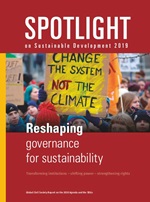The IMF’s role in economic governance: conducive to reducing inequalities within and among countries?
Published on Thu, 2019-11-07 17:06
Increasingly, the International Monetary Fund (IMF) is claiming a role for itself as a central player in the implementation of the 2030 Agenda, and has positioned itself as an important actor on SDG 10 and tackling inequalities (economic and gender-based). However, in practice this commitment has been patchy at best, with little evidence of any meaningful policy realignment. Drawing on the examples of Egypt and Brazil, Kate Donald and Mahinour El-Badrawi, from CESR, and Grazielle David from the University of Campinas, show how IMF governance has led to deepening of social and economic inequalities, and threats to human rights enjoyment. The IMF plays a central role in economic governance, both at the global and national levels. Although it presents itself as neutral economic arbiter, its approach is in fact deeply rooted in certain economic orthodoxies, many of which have proven incompatible with the achievement of sustainable development and the meaningful reduction of inequalities, particularly in the Global South. Drawing on the examples of Egypt and Brazil, we present concrete examples of how IMF governance – in its various forms – has led to deepening of social and economic inequalities, and threats to human rights enjoyment. This is in stark contrast to the image that the IMF is painting of itself as a champion of the SDGs. Increasingly, the IMF is claiming a role for itself as a central player in the implementation of the 2030 Agenda, and has positioned itself as an important actor on SDG 10 and tackling inequalities (economic and gender-based). However, in practice this commitment has been patchy at best, with little evidence of any meaningful policy realignment. 1 Are the IMF’s actions really conducive to ‘Transforming Our World’, the official title of the Agenda? By Kate Donald, CESR and Grazielle David, University of Campinas and Mahinour El-Badrawi, CESR. Read the chapter SDG 10 – The IMF’s role in economic governance: conducive to reducing inequalities within and among countries? |


